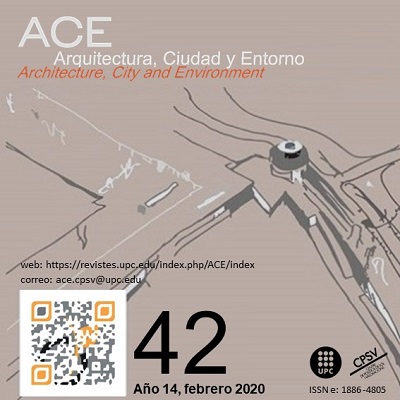The sensitive experience of soundscape within a natural disaster: the case of the tsunami of 27f in Caleta Tumbes, Talcahuano, Chile
DOI:
https://doi.org/10.5821/ace.14.42.7007Keywords:
Sound perception, memory, tsunami, sound spaceAbstract
This research is a two-year project, funded by the Research Department of Universidad de Las Americas, Chile, which seeks to establish the relationship between soundscape and memory of a community based on the sounds of an area that has suffered a natural disaster. From the reconstitution of the sound sources of the moment of the catastrophe, it is possible to reconstruct the acoustic memory of the affected community. The research deals with catastrophe studies from an acoustic variable that allows the event to be approached from the sensitive experience. Its focus on community and perception, centers the collection of information on personal experience and memory for the reconstruction of an event that does not keep records. The case study is the earthquake and tsunami of February 27, 2010 in Caleta Tumbes, Talcahuano, Chile. A methodology based on sound perception has been used, with a sample of people in four phases: 1) Sound mental map, 2) Itinerary, 3) Collection of stories, and 4) Reactive listening. The soundscape of the catastrophe depends on the sensitive experience of its community and is modified according to memory. From the relationship of environmental sounds with the community, the changes that a natural catastrophe can make in the acoustic appreciation of a place are identified. By joining different interpretations of the 27f event, common elements appear that begin to reconstruct a precise panorama around a temporality of the sound facts.
Downloads
Published
Issue
Section
License
| INTELECTUAL PROTECTION CRITERIA |
At this moment, it is count with the "Oficina Española de Patentes y Marcas", while global protection it is being processed by the World Intelectual Property Organization (OMPI/WIPO). Nevertheless the International Standard Serial Number Office (ISSN) has given the following numbers ISSN: 1886-4805 (electronic version) and 1887-7052 (paper version). All articles will be peer reviewed, using double blind reviewing. |
| COPYRIGHT |
The article contents and their comments are authors exclusive liability, and do not reflect necessarily the journal editor commitee's opinion. All ACE published works are subject to the following licence CC BY-NC-ND 3.0 ES http://creativecommons.org/licenses/by-nc-nd/3.0/es/ It implies that authors do not hold nor retain the copyright without restrictions but only those included in the licence. |


































